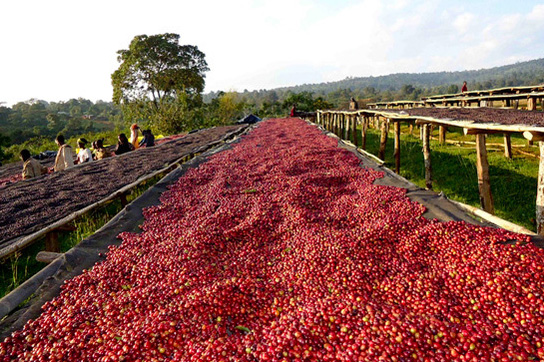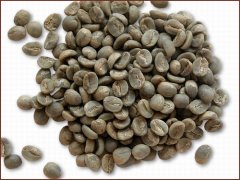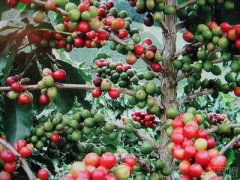A brief talk on the basic knowledge of coffee beans in Yunnan

Every time when giving lessons to students, some students will curiously take the initiative to ask about many topics of Yunnan coffee beans. Although there are not many people who have really drunk Yunnan coffee, "Yunnan small grain coffee" has long been famous and respectable. As most of our students are investors and operators of coffee shops, the development trend of the domestic coffee industry accounts for a "great weight". Their increasing attention to Yunnan coffee undoubtedly indicates the bright future of Yunnan coffee.
So what about Yunnan coffee beans? Let's try to act as a glimpse into the management from several aspects.
First of all, at present, the main producing areas of coffee beans in Yunnan, Pu'er (formerly known as Simao, just changed in 2007), Baoshan, Dehong and Lincang are all in what we call "CoffeeBelt". The unique comprehensive natural conditions make it possible to breed high-quality coffee. When the Japanese can only invest a lot of money in the greenhouse to take good care of the fragile coffee trees, we have large tracts of fertile land to grow coffee. We have to thank God for the gift! The gift of the ancestors of opening up the border and expanding the land!
Secondly, talk about the taste of Yunnan coffee beans. Many coffee lovers and coffee practitioners around me appreciate the quality and taste of Yunnan coffee beans and rejoice at the balance expressed by Yunnan coffee. Don't worry, the above is just a matter of opinion. Once anything talks about taste, it rises to the level of "taste" and immediately becomes a "subjective problem" in which the benevolent see benevolence and the wise see wisdom. There are many experts around me who hold negative views on the taste of Yunnan coffee beans. Why is that? In my opinion, the taste of Yunnan coffee beans is very similar to the Chinese character-more than moderation, lack of personality-good balance, I am afraid it also means that sour and bitter and other happy "exciting points" are not enough. Maybe at this stage, Yunnan small coffee beans are only a kind of "Asia-Pacific flavor", which is suitable for making instant coffee, especially those high-end instant coffee.
In addition, the current production of Yunnan coffee beans, suffering from many other links have not been able to keep up, there is still a gap between its quality and its geographical and natural conditions, there is still a long way to go from the "special coffee" gap. In other words, if the hardware and software matching work is done more solidly, the quality of Yunnan coffee beans still has amazing room for improvement. So what needs to be improved? First, strict, scientific and unified planting and management is very necessary. The author has seen high-quality original coffee beans with zero pesticide residues in Yunnan, and coffee beans that depend on pesticides in just a few months. Who will take care of them? How to check it? It is far from enough to rely on the quality control of giants such as Nestl é at the time of acquisition, including the government and industry associations, there are still many things to do. Second, coffee farmers still know very little about coffee. At present, most farmers are still in the stage of "growing coffee without drinking coffee". There are coffee fruits and beans all over the yard, but they are drinking a cup of tea. Compared with the grape farmers I have seen in Italy and France, it can be said that they are all experts in wine tasting. There's a big difference! There is a good comparison: if a barista refuses to drink coffee, how can he grasp the essence of coffee making? Third, the lack of standards, so that products lack market competitiveness, so that consumers do not know what to do. The author specially searched the Internet to find several articles about the establishment of scientific standards for Yunnan coffee, such as "Yunnan Coffee Factory actively participated in the formulation of national standards and industry standards", etc., but with all due respect, there is still a huge gap from the imagined standardization. Comrades still need to work hard!
Finally, I would like to say that every one of our practitioners is full of expectations for Yunnan coffee beans and pays tribute to those enterprises that actively promote Yunnan coffee. However, Yunnan coffee beans must continue to learn from the development experience of domestic wine in previous years, and must not be impetuous and rash in front of snowflake orders, and must be down-to-earth, step by step. Nor can it be satisfied to be the raw material supplier of some world-class coffee brands for a long time. Mr. Zhang Shineng, a coffee maker in Kunming, said well: "…"... Like other industries, individual mistakes in one industry do not lead to the result of giving up eating for fear of choking. The early maturity of coffee reflects the lack of expertise of some farmers in coffee cultivation, not others. "
Maybe in the near future, the mellow Yunnan coffee will be placed in front of every one of our friends.
Important Notice :
前街咖啡 FrontStreet Coffee has moved to new addredd:
FrontStreet Coffee Address: 315,Donghua East Road,GuangZhou
Tel:020 38364473
- Prev

Basic knowledge of boutique coffee how to choose raw coffee beans
What kind of raw beans are high-quality raw beans? First look at the surface of beans, fresh and high-quality raw beans, the surface is shiny, in addition, the processing of good raw beans, uniform color, the surface of uneven color can not be called good beans, must choose uniform color. Secondly, the particle size is the same, which is also evidence of good quality management. Make sure that the particle size is the same when you buy it.
- Next

General knowledge of fine coffee characteristics of small seed coffee in Yunnan
[scientific name] the small seed is Coffea arabica L., the medium seed is Coffea canephora, and the large seed is Coffea liberica family: Rubiaceae Coffee is also called Arabian species, medium grain species is also called Gaffra species, and large grain species are also called Liberian species, there are two common species: Arabica and Robusta. Coffee is rich in protein and fat.
Related
- Guji coffee producing area of Guji, Ethiopia: Humbela, Shakiso, Wulaga
- What is the most expensive variety of Qiloso in BOP multi-variety group?
- How to store the coffee beans bought home?
- Why are Yemeni coffee beans so rare now?
- Ethiopian Sidamo all Red Fruit Sun Sun Santa Vini Coffee beans
- SOE is mostly sour? What does it mean? Is it a single bean? what's the difference between it and Italian blending?
- Is Italian coffee beans suitable for making hand-brewed coffee?
- How to choose coffee beans when making cold coffee? What kind of coffee beans are suitable for making cold coffee?
- Just entered the pit to make coffee, what kind of coffee beans should be chosen?
- Can only Japan buy real Blue Mountain Coffee? What are authentic Jamaican Blue Mountain coffee beans?

